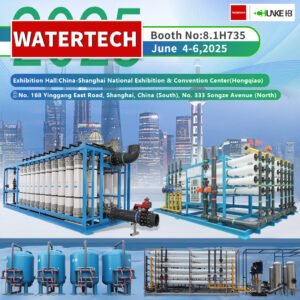We will explain Water Filtration System for boiler in this article. Water plays a crucial role in the operation of boilers, serving as the primary medium for heat transfer. However, the presence of impurities in the water can have detrimental effects on boiler performance and longevity. To address this issue, water filtration systems for boilers have become an essential component of preventive maintenance programs. So, these systems are designed to remove impurities, such as scale, corrosion-inducing minerals, and suspended solids, ensuring safe and efficient boiler operation. In this comprehensive guide, we will explore the importance of water filtration systems for boilers, the various treatment methods available, and their benefits in maintaining optimal performance and extending the lifespan of your boiler, accordingly.
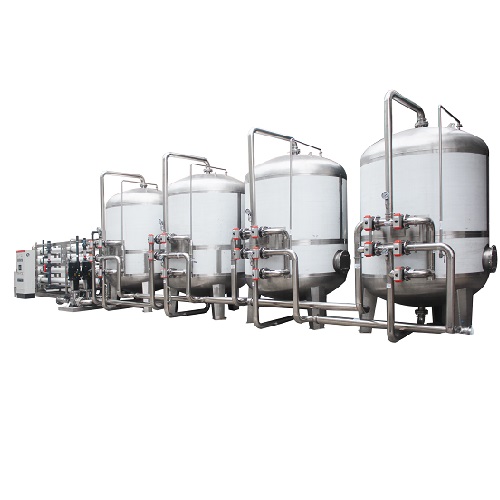
Understanding Boiler Feed Water Contaminants
Before delving into the significance of water filtration systems. So, it is essential to understand the contaminants commonly found in boiler feed water. So, these contaminants can vary depending on the water source and the specific application. Some of the most common impurities include:
Scale-inducing minerals:
Calcium, magnesium, and other minerals can accumulate on the heat transfer surfaces of the boiler, forming scale deposits. Hence, these deposits reduce heat transfer efficiency. And it increases energy consumption, and potentially lead to overheating and equipment failure.
Corrosion-inducing substances:
Impurities such as iron, copper, and silica can promote corrosion within the boiler system. So, corrosion weakens the structural integrity of the boiler, leading to leaks, equipment damage, and costly repairs.
Suspended solids:
Solid particles, organic matter, and debris present in the water can cause fouling and blockages in the boiler system. So, this not only reduces efficiency but also hinders proper water circulation. And increasing the risk of overheating and equipment failure.
Dissolved gases:
Oxygen and carbon dioxide dissolved in boiler feed water can lead to corrosion and pitting of boiler components. Removing these gases is crucial to maintaining the integrity of the system, accordingly.
CHUNKE Water Filtration System for Boiler
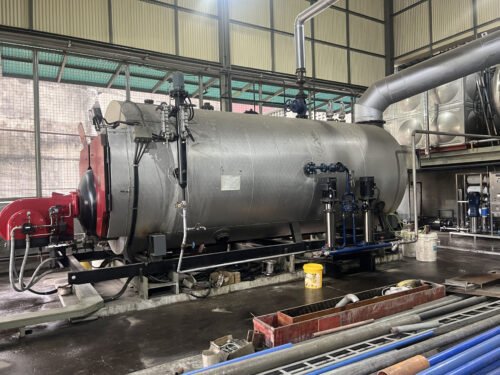
Water Filtration System for Boiler
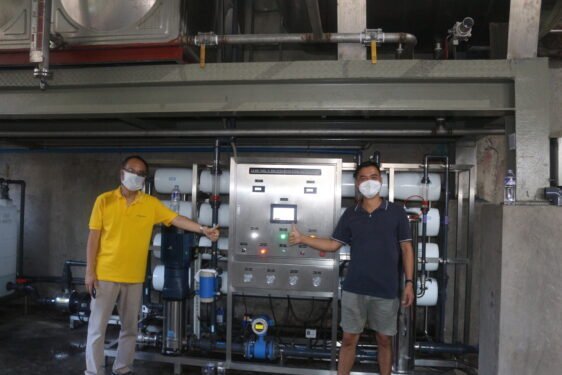
3000LPH Reverse Osmosis System For Boiler
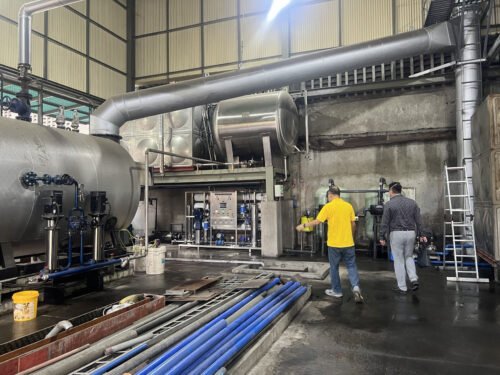
Water Filtration System for Boiler
Importance of Water Filtration Systems for Boiler
Water filtration systems are designed to address the challenges posed by these contaminants, ensuring the optimal performance and longevity of boilers. By effectively removing impurities, these systems offer the following benefits:
1. Scale Prevention and Control
One of the primary functions of water filtration systems for boilers is to prevent and control the formation of scale deposits. So, scale is a hard coating that forms on heat transfer surfaces due to the precipitation of minerals present in the water. These deposits act as insulators, reducing heat transfer efficiency and increasing energy consumption. Hence, water filtration system for boiler, such as reverse osmosis (RO) and nanofiltration, effectively remove scale-inducing minerals, preventing the formation of scale deposits and maintaining optimal boiler performance.
2. Corrosion Protection
Corrosion can significantly impact the lifespan and reliability of boiler systems. Water filtration system for boiler employ various methods, such as chemical treatments and electrodeionization (EDI), to control corrosion-inducing substances in boiler feed water. Chemical treatments, such as oxygen scavengers and neutralizing amines, react with dissolved gases and acids, preventing corrosion and extending the lifespan of boiler components. Hence, EDI systems, on the other hand, offer a chemical-free approach to producing ultra-pure water, eliminating the need for hazardous chemicals and reducing environmental impact.
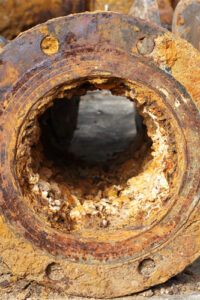
3. Removal of Suspended Solids
Suspended solids, including debris and organic matter, can cause fouling and blockages in boiler systems, leading to reduced efficiency and potential equipment failure. So, water filtration system for boiler, equipped with advanced filtration and ultrafiltration technologies, effectively remove suspended solids, ensuring uninterrupted water flow and optimal boiler performance. Hence, these systems utilize coagulation, flocculation, and filtration processes to remove particles of varying sizes, maintaining clean and clear boiler feed water.
4. Dissolved Gas Removale
Dissolved gases, such as oxygen and carbon dioxide, can cause corrosion and pitting of boiler components. Water filtration system for boiler, incorporate degasification techniques, such as membrane processes and advanced deaeration devices, to remove dissolved gases from boiler feed water. By eliminating these corrosive elements, these systems help protect the integrity of the boiler system and extend its operational life.
Water Filtration Technologies for Boiler Systems
To combat the various contaminants found in boiler feed water, different water filtration technologies can be employed. So, these technologies work in tandem to ensure comprehensive water treatment. First, let’s explore some of the most commonly used water filtration technologies for boilers:
1. Reverse Osmosis (RO) Systems
Reverse osmosis is a widely adopted water filtration technology that utilizes a semi-permeable membrane to remove dissolved solids and impurities from water. So, RO systems effectively remove scale-inducing minerals, dissolved gases, and suspended solids, providing high-quality water for boiler feed. Hence, these systems operate by applying pressure to the water, forcing it through the membrane and leaving behind contaminants. RO systems are known for their efficiency, versatility, and ability to produce purified water suitable for a wide range of applications.
2. Electrodeionization (EDI) Systems
Electrodeionization, also known as EDI, is a water purification process that combines ion exchange resins and electrical current to remove impurities from water. EDI systems offer a chemical-free approach to producing ultra-pure water, making them an environmentally friendly choice for boiler feed water treatment. These systems continuously regenerate ion exchange resins, eliminating the need for chemical regeneration and reducing operating costs. EDI systems are highly effective in removing dissolved salts, suspended solids, and trace contaminants, ensuring the production of high-quality water for boiler systems.
3. Filtration and Ultrafiltration
Filtration and ultrafiltration technologies play a crucial role in removing suspended solids and organic matter from boiler feed water. Filtration systems utilize various media, such as sand, activated carbon, and multimedia filters, to trap and remove particles of different sizes. Ultrafiltration, on the other hand, employs advanced membranes with pore sizes ranging from 0.01 to 0.1 microns to effectively remove suspended solids, colloids, and bacteria. These filtration technologies ensure the delivery of clean and clear water to boilers, minimizing the risk of fouling and blockages.
4. Chemical Treatments
In addition to physical filtration methods, chemical treatments are often used to address specific water quality issues in boiler feed water. Oxygen scavengers and neutralizing amines are commonly employed to prevent corrosion and control the pH of the water. Oxygen scavengers react with any remaining oxygen in the water, reducing the risk of corrosion. Neutralizing amines help maintain the proper pH level, protecting the metallurgy of the boiler system. These chemical treatments, when used in conjunction with filtration technologies, provide comprehensive water treatment solutions for boilers.
Choosing the Right Water Filtration System for Boiler
Selecting the appropriate water filtration system for your boiler depends on several factors, including the water source, boiler type, and operating conditions. Conducting a thorough water analysis and understanding the specific water quality requirements of your boiler system is crucial in determining the most suitable treatment options. Factors to consider when choosing a water filtration system include:
- Water source: Determine whether the water source is city water, well water, or surface water, as different sources may require specific treatment methods.
- Water quality: Assess the level of impurities present in the water, such as scale-inducing minerals, suspended solids, and dissolved gases. This information will help determine the required treatment technologies.
- Boiler type: Consider the type of boiler system you have, as certain systems may require more advanced treatment methods to meet their specific needs.
- Operational conditions: Take into account the operational parameters of the boiler, such as pressure, temperature, and flow rate. These factors can influence the selection and sizing of the water filtration system.
By carefully evaluating these factors and consulting with water treatment experts, you can choose a water filtration system that best suits the unique requirements of your boiler system.
Water Filtration Systems for Boilers: Ensuring Optimal Performance and Longevity
Water filtration systems play a vital role in maintaining the performance, efficiency, and longevity of boiler systems. By effectively removing impurities, such as scale-inducing minerals, corrosion-inducing substances, suspended solids, and dissolved gases, these systems ensure safe and reliable operation. Reverse osmosis (RO) systems, electrodeionization (EDI) systems, and various filtration technologies offer comprehensive solutions for treating boiler feed water. By selecting the appropriate water filtration system and implementing regular maintenance practices, you can safeguard your boiler system from the damaging effects of impurities and prolong its lifespan. Invest in a reliable water filtration system for your boiler today and experience the benefits of optimal performance and cost savings in the long run.

